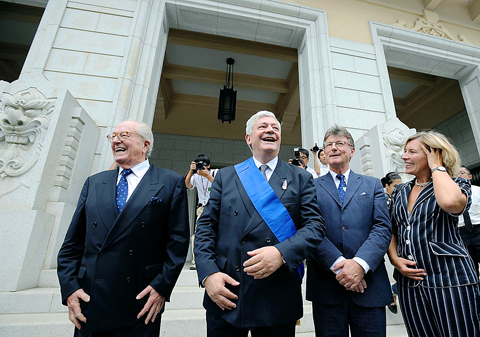French nationalist Jean-Marie Le Pen and other European right-wing politicians paid a visit yesterday to a Japanese shrine that has drawn outrage for honoring war criminals.
Le Pen, leader of the far-right French National Front and Adam Walker of the British National Party said they were making the visit, which comes a day ahead of the 65th anniversary of the end of World War II, to pay respect to those who died in war.
“What counts is the will that we had to honor those who have fallen for defending their country, whether they are Japanese, or any soldiers of the world, we have the same respect for them,” Le Pen told reporters.

PHOTO: EPA
Le Pen is known for his anti-immigrant and extremist views. He shocked France when he qualified for the second round of the 2002 presidential race, which Jacques Chirac eventually won.
The visit to Yasukuni, an ornate Shinto shrine in downtown Tokyo, was arranged by the International Conference of Patriotic Organisations, which brought together right-wing parties from eight European countries with members of a Japanese ultranationalist group called the Issuikai.
Yasukuni honors Japan’s war dead, including convicted war criminals. Pacifists and victims of Japanese aggression, such as China and the Koreas, say it glorifies Japan’s past militarism.
The visit by Le Pen and others may also anger some former prisoners of war in those countries being represented by the right-wing groups.
Tens of thousands of British, Dutch and other European soldiers and civilians were captured by the Japanese Imperial Army as it swept across Europe’s former Asian colonies at the beginning of World War II. Thousands were executed, tortured and starved to death in Japanese prisoner-of-war camps.
When asked about his visit, Walker said: “I’m honoring the dead. I am here to honor the dead — heroes that have died for their country.”
In the past, visits to Yasukuni by Japanese politicians have provoked outrage from China, South Korea and neighboring Asian countries.
Some lawmakers, as well as hundreds of regular Japanese whose relatives and friends died as soldiers in World War II, are expected to visit Yasukuni today to mark the end of World War II.
However, Japanese Prime Minister Naoto Kan and his ministers are expected to shun the visit — the first time all members of a Japanese Cabinet will stay away.
Kan’s liberal Democratic Party defeated the long-reigning conservative Liberal Democrats for the first time in decades in last year’s parliamentary elections.
Earlier this week, Kan apologized to South Korea for its colonial rule and the suffering Japan caused the Korean people, and expressed hopes for a partnership.
Japanese leaders have repeatedly apologized for wartime aggression against its Asian neighbors, including a 1995 apology from a leftist-leaning prime minister that marked the 50th anniversary of the end of World War II.

CHAOS: Iranians took to the streets playing celebratory music after reports of Khamenei’s death on Saturday, while mourners also gathered in Tehran yesterday Iranian Supreme Leader Ayatollah Ali Khamenei was killed in a major attack on Iran launched by Israel and the US, throwing the future of the Islamic republic into doubt and raising the risk of regional instability. Iranian state television and the state-run IRNA news agency announced the 86-year-old’s death early yesterday. US President Donald Trump said it gave Iranians their “greatest chance” to “take back” their country. The announcements came after a joint US and Israeli aerial bombardment that targeted Iranian military and governmental sites. Trump said the “heavy and pinpoint bombing” would continue through the week or as long

TRUST: The KMT said it respected the US’ timing and considerations, and hoped it would continue to honor its commitments to helping Taiwan bolster its defenses and deterrence US President Donald Trump is delaying a multibillion-dollar arms sale to Taiwan to ensure his visit to Beijing is successful, a New York Times report said. The weapons sales package has stalled in the US Department of State, the report said, citing US officials it did not identify. The White House has told agencies not to push forward ahead of Trump’s meeting with Chinese President Xi Jinping (習近平), it said. The two last month held a phone call to discuss trade and geopolitical flashpoints ahead of the summit. Xi raised the Taiwan issue and urged the US to handle arms sales to

State-run CPC Corp, Taiwan (CPC, 台灣中油) yesterday said that it had confirmed on Saturday night with its liquefied natural gas (LNG) and crude oil suppliers that shipments are proceeding as scheduled and that domestic supplies remain unaffected. The CPC yesterday announced the gasoline and diesel prices will rise by NT$0.2 and NT$0.4 per liter, respectively, starting Monday, citing Middle East tensions and blizzards in the eastern United States. CPC also iterated it has been reducing the proportion of crude oil imports from the Middle East and diversifying its supply sources in the past few years in response to geopolitical risks, expanding

Pro-democracy media tycoon Jimmy Lai’s (黎智英) fraud conviction and prison sentence were yesterday overturned by a Hong Kong court, in a surprise legal decision that comes soon after Lai was jailed for 20 years on a separate national security charge. Judges Jeremy Poon (潘兆初), Anthea Pang (彭寶琴) and Derek Pang (彭偉昌) said in the judgement that they allowed the appeal from Lai, and another defendant in the case, to proceed, as a lower court judge had “erred.” “The Court of Appeal gave them leave to appeal against their conviction, allowed their appeals, quashed the convictions and set aside the sentences,” the judges